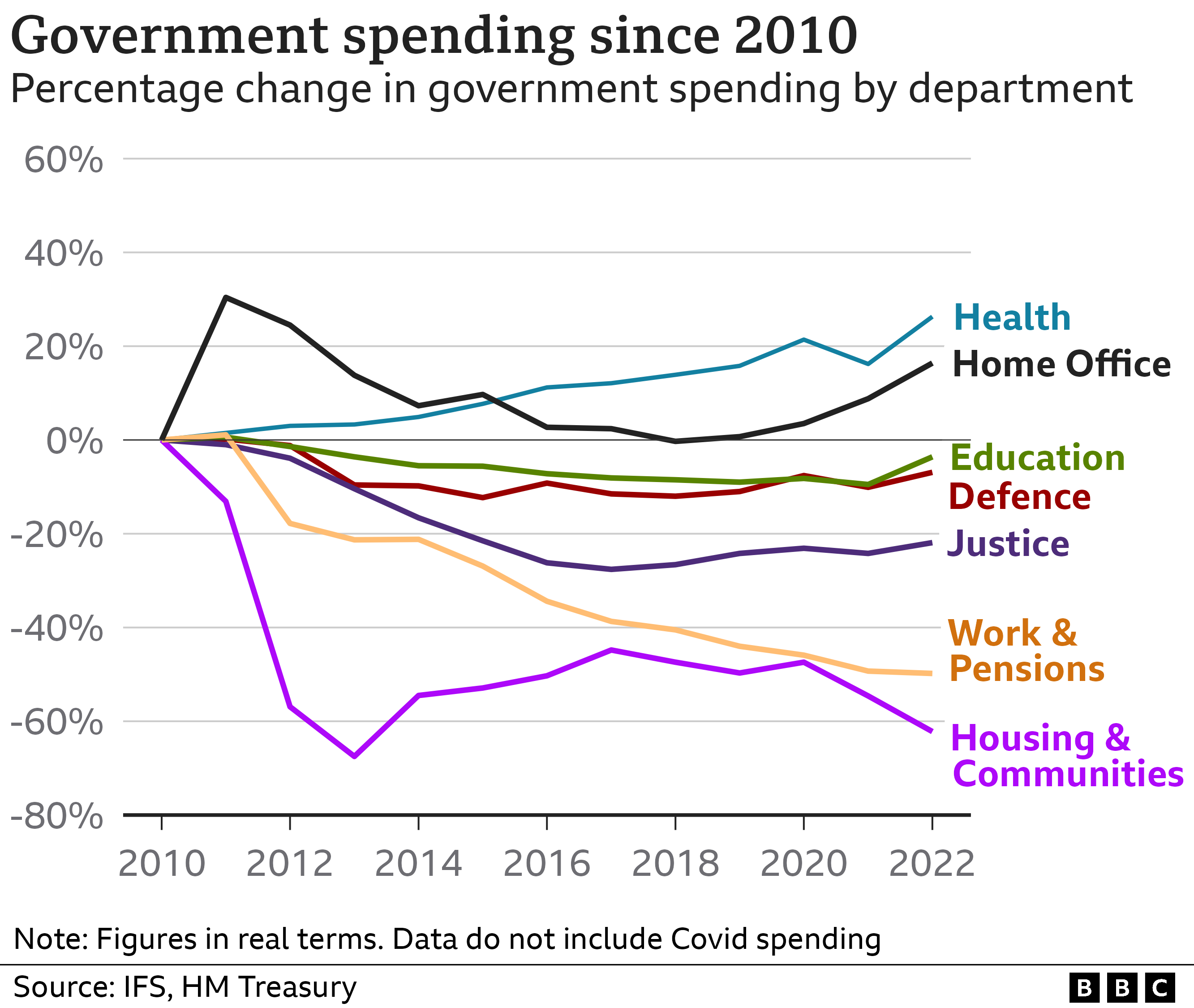This video can not be played
To play this video you need to enable JavaScript in your browser.
The Chancellor is putting the finishing touches to the government's second financial package in under two months.
Jeremy Hunt is expected to dismantle much of what his predecessor Kwasi Kwarteng announced in his mini-budget on 23 September.
On Thursday, Mr Hunt will unveil his Autumn Statement - a Budget in all but name - to "get our way back to growing healthily", as he puts it.
The Treasury say nothing confirmed until the statement is announced. But we do know some of what is likely to be announced.
Spending cuts v tax rises
After the uncertainty of the last few weeks, Mr Hunt said he wants to reduce the size of the so-called fiscal black hole - the gap between what the government raises and spends. This will involve political choices about how much debt is acceptable, what taxes can go up and what spending can be squeezed.
The exact level of spending cuts and tax increase changes based on different decisions being signed off. But the accepted wisdom in the Treasury is that there will be more spending cuts than tax rises. This is likely to mean spending cuts of about £35bn and tax rises of around £20bn.
The Treasury is trying to emphasise this is quite different from the George Osborne era, when the vast majority of savings came through spending cuts.
But a number of Conservative MPs are unhappy at the tax increases we are likely to see - so there could be some political pushback ahead.

Stealth taxes
This could be a big theme of the Autumn Statement. Stealth taxes involve freezing the thresholds at which people start paying different rates of tax.
For the last few weeks, the Treasury has been discussing a wide range of tax thresholds which could be frozen. But because of inflation and pay increases, this involves people paying more tax because more of their money qualifies for a given tax band.
The final plans are still be signed off, but the signs are that this could be used pretty widely. Income tax bands are likely to be frozen until 2028 - it's also likely that threshold at which people start paying the 45p tax rate could be reduced to £125,000. That's quite a turnaround from the days of Liz Truss and Mr Kwarteng wanted to scrap the additional rate altogether.
Energy bills
Ms Truss had planned a massive support package when she was in Downing Street; limiting the average unit price for two years. This "energy price guarantee" meant that typical households would pay no more than £2,500 on gas and electricity annually.
That is not going to happen under Rishi Sunak, because the government is worried about the cost. Instead there will be a more targeted approach from April.
It's expected the chancellor will still announce a cap of some sort on Thursday, but it will mean bills going up for a lot of people. There is likely to be support for certain groups like those on low incomes and pensioners.
Windfall tax
Rishi Sunak introduced the Windfall Tax on the profits of oil and gas companies when he was chancellor. But ever since, there have been calls for it to be extended, both in timescale and scope.
This is another revenue raiser which looks likely, the question is how. Treasury officials have been exploring increasing the rate of the tax to 35%, extending the time frame the windfall tax applies for and bringing electricity generators into the scope.
Labour wants loopholes closed. At the moment, if oil and gas companies can offset their tax liability if they invest profits in the UK. There was controversy when it emerged Shell had not been liable for any Windfall Tax, despite reported profits of £25.4bn ($30bn) this year - more than double the amount it made over same period in 2021.

Social care
Remember the health and social care levy? It was Boris Johnson's plan to try and cap the amount of money people in England paid for social care.
But it was a tax rise that Conservative members didn't like - and Ms Truss scrapped it. Rishi Sunak isn't going to open that can of worms again, so the money it would have raised has gone, leaving big questions over how a cap would be funded.
It is expected that on Thursday, the chancellor will postpone the introduction of the social care cap for at least two year - roughly the period covered by the spending review. That would kick the decision until after a general election and opens the door to the cap being scrapped altogether.
Triple lock and benefits
This is one of the biggest spending decisions the Treasury has been weighing up. Should pensions and benefits go up by the rate of inflation, despite the rate being extremely high at the moment?
Nobody in government will confirm this, but the mood music is both are likely to happen.
The government committed to the pensions triple lock in its manifesto, something which the prime minister has talked a lot about. The triple lock is popular with Conservative voters. And if the prime minister decided not to follow it, he would risk a rebellion among Tory MPs.
The same is true on benefits. Ms Truss faced a lot of pressure to commit to uprating benefits in line with inflation. Among those pressing her were some senior MPs who are now in Mr Sunak's cabinet, including Michael Gove and Mel Stride.
And it was Mr Sunak as chancellor who promised earlier this year the benefits increase would be in line with inflation. He would face a lot of political flack if he changed his mind, despite the changing economic picture.
Council Tax
One of the taxes which is likely to go up soon is council tax in England.
The government currently limits the amount councils can increase the tax to 3% without a referendum to approve bigger hikes.
But the Treasury has been discussing ways that limit could be increased. It wouldn't mean councils can put tax up by as much as they want without asking voters, but it would mean they can increase it by more. We don't know exactly how much the increase will be, but there has been speculation the limit could go up to 5%.
This is a way of increasing funding for public services and social care without the government directly raising taxes. But it would increase pressure on household budgets. The Tory manifesto in 2019 said local people would continue to have the final say on council tax, being able to veto "excessive rises".
Capital Gains Tax
When it comes to tax rises, we're told the chancellor is of the view that the greatest burden should fall on those with the broadest shoulders.
We'll have to see how that pans out but Capital Gains Tax is one levy that looks very likely to be targeted. The tax is paid on the profit gained when an asset is sold - a second home or shares, for instance.
It is not clear yet if it would be an overall rise in the rate - something one source believed to be unlikely - or another change to thresholds or exemptions.
https://news.google.com/__i/rss/rd/articles/CBMiLWh0dHBzOi8vd3d3LmJiYy5jb20vbmV3cy91ay1wb2xpdGljcy02MzYyMjAzMtIBMWh0dHBzOi8vd3d3LmJiYy5jb20vbmV3cy91ay1wb2xpdGljcy02MzYyMjAzMi5hbXA?oc=5
2022-11-15 09:11:24Z
1648934787
Tidak ada komentar:
Posting Komentar